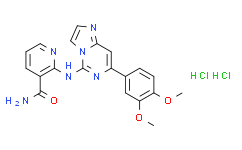| Description: |
BAY 61-3606 is a potent, ATP-competitive, reversible, and highly selective inhibitor of Syk tyrosine kinase activity (Ki= 7.5 nM) with no inhibitory effect against Btk, Fyn, Itk, Lyn, and Src. |
| In Vivo: |
Oral administration of BAY 61-3606 to rats significantly suppressed antigen-induced passive cutaneous anaphylactic reaction, bronchoconstriction, and bronchial edema at 3 mg/kg. Furthermore, BAY 61-3606 attenuated antigen-induced airway inflammation in rats [1]. |
| In Vitro: |
BAY 61-3606 inhibited not only degranulation (IC50 values between 5 and 46 nM) but also lipid mediator and cytokine synthesis in mast cells. BAY 61-3606 was highly efficacious in basophils obtained from healthy human subjects (IC50 = 10 nM) and seems to be at least as potent in basophils obtained from atopic (high serum IgE) subjects (IC50 = 8.1 nM). B cell receptor activation and receptors for Fc portion of IgG signaling in eosinophils and monocytes were also potently suppressed by BAY 61-3606 [1]. We identified BAY61-3606 as an inhibitor of proliferation in colorectal cancer cells expressing mutant forms of K-RAS, but not in isogenic cells expressing wild-type K-RAS. In addition to its anti-proliferative effects in mutant cells, BAY61-3606 exhibited a distinct biological property in wild-type cells in that it conferred sensitivity to inhibition of RAF. In this context, BAY61-3606 acted by inhibiting MAP4K2 (GCK), which normally activates NFκβ signaling in wild-type cells in response to inhibition of RAF [2]. |
| References: |
[1]. Yamamoto N, et al. The orally available spleen tyrosine kinase inhibitor 2-[7-(3,4-dimethoxyphenyl)-imidazo[1,2-c]pyrimidin-5-ylamino]nicotinamide dihydrochloride (BAY 61-3606) blocks antigen-induced airway inflammation in rodents. J Pharmacol Exp Ther. 2
[2]. Lau KS, et al. BAY61-3606 affects the viability of colon cancer cells in a genotype-directed manner. PLoS One. 2012;7(7):e41343. |






















